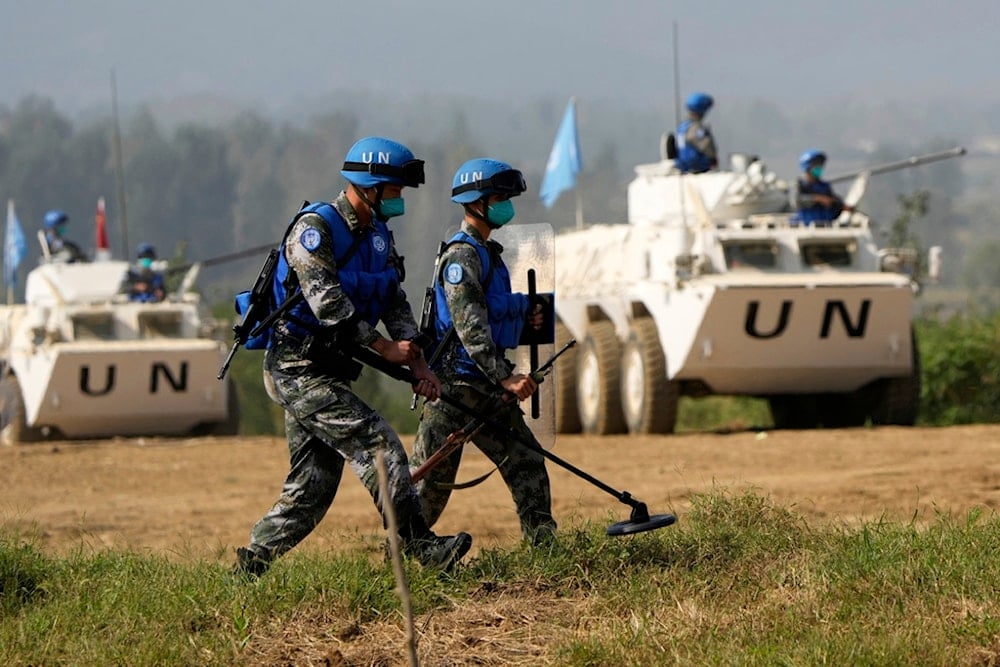UN to slash peacekeeping operations as US funding cuts take effect
The United Nations is reducing its global peacekeeping force and cutting agency budgets after major US funding slashes under Trump's "America First" policy.
-

FILE - Chinese United Nations troop practice sweeping for mines during the Shared Destiny 2021 drill at the Queshan Peacekeeping Operation training base in Queshan County in central China's Henan province Sept. 15, 2021. (AP Photo/Ng Han Guan, File)
The United Nations is set to withdraw thousands of peacekeepers and scale down several global missions after the United States, the UN's largest funder, sharply curtailed its financial support under President Donald Trump's "America First" policy.
A senior UN official, speaking anonymously about a confidential meeting, told reporters that a quarter of the peacekeeping force, approximately 13,000 to 14,000 troops and police, will be sent home over the coming months. The announced reductions form part of a sweeping response to a sudden shortfall in US contributions and a push to realign priorities amid mounting fiscal pressure.
Under the plan, the peacekeeping budget will shrink by around 15%, with significant implications for mission deployments in Somalia, South Sudan, the Democratic Republic of Congo, Lebanon, Cyprus, and Kosovo. While all 193 member states are legally obligated to support UN peacekeeping, the scale of the US withdrawal has produced an unprecedented funding gap.
UN Secretary-General Antonio Guterres defended the program's value, stating, "With a budget representing a tiny fraction of global military spending, around one half of one percent, UN peacekeeping remains one of the most effective and cost-effective tools to build international peace and security."
Peacekeeping under strain
The trimming decision came shortly after a closed-door meeting between Guterres and top donor diplomats, including US Ambassador to the UN Mike Waltz. Insiders say the Trump administration demanded sweeping reviews of unaccountable programs, tying future US contributions to sharper financial discipline.
Waltz later reiterated America's new priorities in a TV interview, "We have to cut out all of this other nonsense. The White House is focused on getting the UN back to basics of promoting peace, enforcing peace, preventing wars."
The US has committed $680 million to nine active peacekeeping missions, a steep drop from last year's $1 billion contribution. The reduction comes amid a broader retreat from multilateral engagement: Washington has already pulled back funding or membership from UNESCO, the World Health Organization, and the UN Human Rights Council.
UN staffing cuts
But it's not just peacekeeping under strain. Over 60 UN offices, agencies, and field operations are slated for staffing cuts of roughly 20% as part of a broader efficiency overhaul. In the health sector, the US has already halted or threatened funding to bodies like the WHO and UNFPA, jeopardizing critical services in global health and humanitarian operations.
In contrast, China has pledged to honor its full financial obligations, wielding its role as a major donor, about 20% of the UN's regular budget and 24% of peacekeeping contributions, as leverage. That shift amplifies Beijing's influence at a moment when US commitments are in flux.
Read more: US leaves power vacuum in UN, China jumps in to fill it
Within UN circles, senior officials say this phase may represent one of the most consequential budget retrenchments in its modern era, a structural recalibration likely to reshape how the UN engages with conflicts, aid missions, and its own infrastructure. Decisions made now could determine whether the UN is lean enough to survive or weakened in its ability to act.

 3 Min Read
3 Min Read










